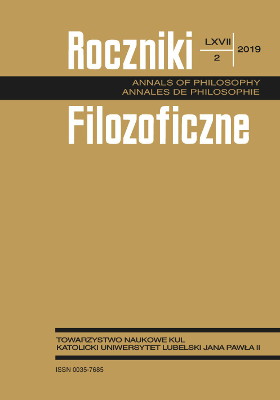Czy niepojętość Boga tłumaczy jego ukrycie? Refleksja z punktu widzenia teizmu personalistycznego
Does God’s Inconceivability Explain His Hiddenness? Remarks from the Point of View of Personalistic Theism
Author(s): Marek DobrzenieckiSubject(s): Philosophy, Special Branches of Philosophy, Philosophy of Religion
Published by: Towarzystwo Naukowe KUL & Katolicki Uniwersytet Lubelski Jana Pawła II
Keywords: J. L. Schellenberg; Roger Pouivet; Michael Rea; the hiddenness argument; analytical philosophy of religion; perfect being theology; necessary being theology; personalistic theism; theistic personalism
Summary/Abstract: One of the counterarguments to the hiddenness argument that gains the popularity in the recent years refers to the inconceivability of God. If God is transcendent, state the proponents of the argument (i. e. Michael Rea and Roger Pouivet), then we do not know if the divine love is expressed in the openness to personal relationships with finite beings, as the first premise of the hiddenness argument claims. They accuse J. L. Schellenberg of shaping the concept of God on the model of modern concepts of person. In response I am indicating at the fact that even though there is a danger of anthropomorphism in Schellenberg’s writings, personalistic theism is bound to accept the first premise of the hiddenness argument. I justify my thesis by referring to the scholastic principle that allows to attribute to God all perfections and by arguing in favour of the thesis that personhood (understood in terms of rationality and freedom) is one of the perfections.
Journal: Roczniki Filozoficzne
- Issue Year: 67/2019
- Issue No: 2
- Page Range: 59-75
- Page Count: 17
- Language: Polish

